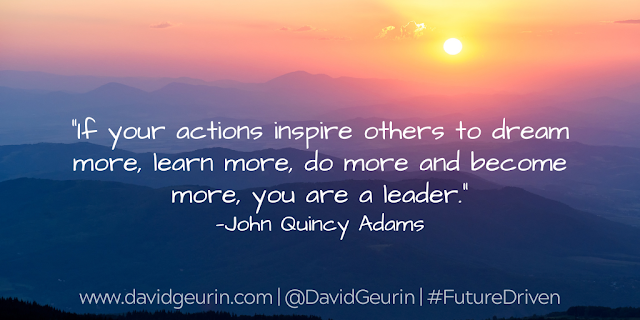Usually, that hope or inspiration was connected to the actions of someone else. Someone lifted me up, inspired me, or provided me with the spark I needed at that time. That's what leaders do. They help you take that next step. They help you find the hope or inspiration to believe something greater is possible.
So I wanted to share a few thoughts on ways to inspire others, some ways to offer hope. If it seems like you've experienced more despair and hopelessness recently, you're not alone. I think that's a common experience for educators right now.
In fact, as I think through this list, I realize how my leadership has fallen short in practicing these behaviors. It's easy to focus on the negative and forget what we can do to meet needs and lift up others. We need to be mindful of how we can help each other and take our important next steps.
11 Ways to Increase Hope and Inspiration
1. Be authentic.
Share your failures and admit your mistakes. Be humble. Be honest about your struggles. As John Maxwell says, "When we share our successes, that may be impressive. But when we share our failures, that's inspiring." Your resilience in the face of setbacks is inspiring to others.
2. Show someone their strengths.
The educators who inspired me the most believed in me the most. They were encouraging to me. They showed me something in myself I didn't see in myself until they came into my life. When someone believes in you, that inspires you and gives you hope.
4. Take productive risks.
No one was ever inspired by someone who was playing it safe or just trying to protect their own comfort. It's inspiring when someone takes a leap, when they just go for it, when they take bold action. You have to be a risk taker to be a difference maker.
"To bring about change, you must not be afraid to take the first step. We will fail when we fail to try." —Rosa Parks
5. Demonstrate passion and commitment.
Passion and commitment are evidence of how much you care. When you have strong values and work to protect and defend those values, that inspires. It shows you have a vision and want to create and build something that is worthwhile and important. Your passion is contagious.
6. Grow yourself.
Before you can inspire others to grow, you have to be willing to grow yourself. Be disciplined. Learn something every day. And share your learning with others. Your example will inspire.
7. Stand for something good and selfless.
People are inspired by something bigger than themselves. They want to do something that matters, that makes a difference, that gives their life meaning and significance. When you stand for something noble and upright, others will be inspired to do the same.
8. Listen to understand.
People are inspired and have hope when they feel seen and understood. When people know that you care about their perspective and will listen to their ideas, they will be more open and optimistic about other people's ideas.
9. Stay calm in the face of adversity.
Inspiring leaders know things are almost never as bad as they seem. And they also know in just about every crisis there are also great opportunities. You'll help others the most when you remain steadfast and unshakable in the midst of a storm.
10. Validate emotions.
I've just learned this in the last few years. Emotions are so important. When we validate someone's experience, that is powerful. It says to them that you care about them. It's tough to have inspiration or hope if you don't feel psychologically safe, if you feel like your feelings don't matter.
11. Be grateful.
Gratitude inspires. Cicero famously observed, "Gratitude is not only the greatest of the virtues, but the parent of all the others." If we want more hope and want to share more hope with others, there may be no better way than with gratitude. Never stop seeing the little miracles all around you.
What inspires you and gives you hope? How could you take these ideas deeper? Leave a comment below or respond on Facebook or Twitter. I would love to hear from you.
What inspires you and gives you hope? How could you take these ideas deeper? Leave a comment below or respond on Facebook or Twitter. I would love to hear from you.



